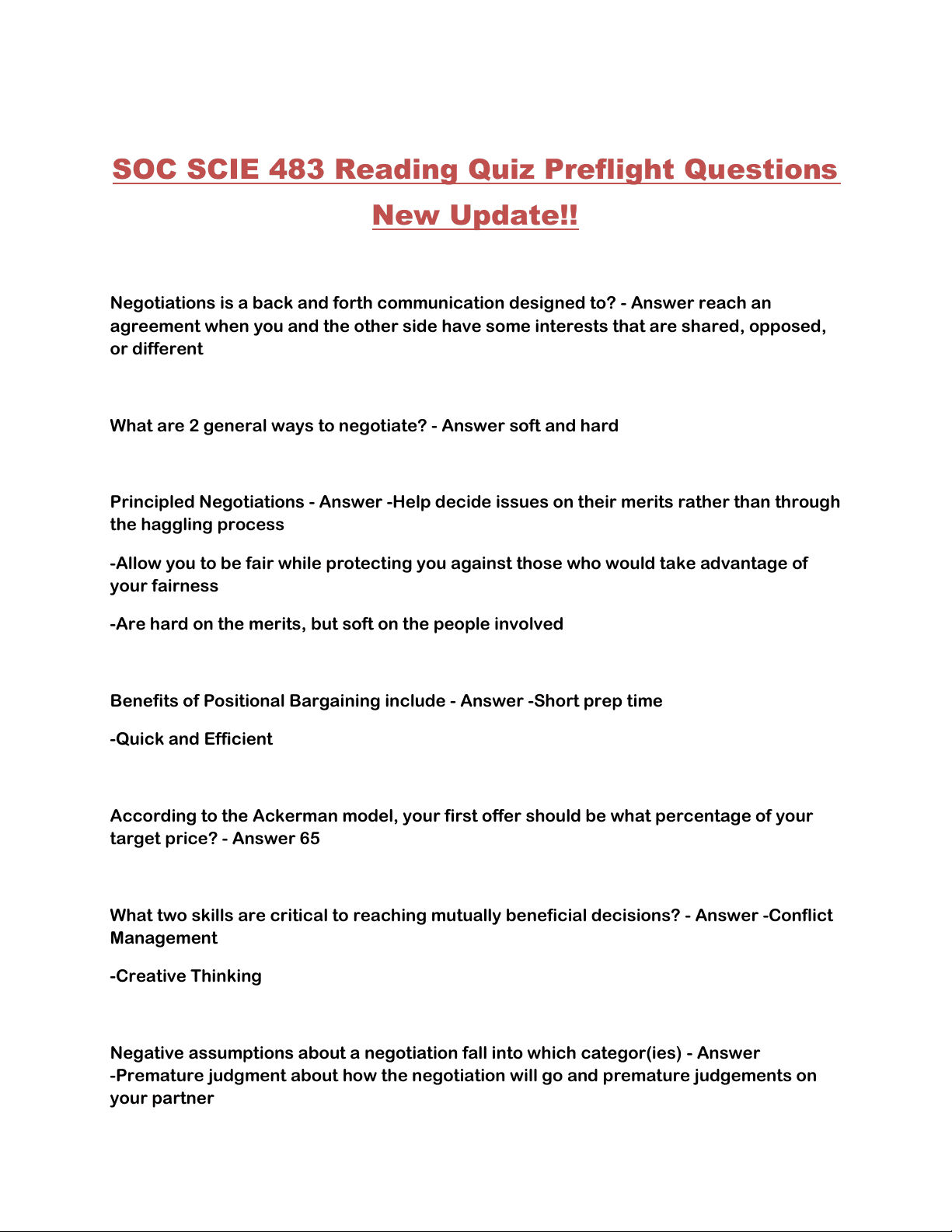




Study with the several resources on Docsity

Earn points by helping other students or get them with a premium plan


Prepare for your exams
Study with the several resources on Docsity

Earn points to download
Earn points by helping other students or get them with a premium plan
Community
Ask the community for help and clear up your study doubts
Discover the best universities in your country according to Docsity users
Free resources
Download our free guides on studying techniques, anxiety management strategies, and thesis advice from Docsity tutors
A series of questions and answers related to negotiation strategies and techniques. It covers key concepts such as principled negotiation, positional bargaining, conflict management, and building rapport. Insights into effective negotiation practices, including the importance of objective criteria, managing emotions, and understanding the other party's perspective. It is a valuable resource for students and professionals seeking to enhance their negotiation skills.
Typology: Exams
1 / 4

This page cannot be seen from the preview
Don't miss anything!



Negotiations is a back and forth communication designed to? - Answer reach an agreement when you and the other side have some interests that are shared, opposed, or different
What are 2 general ways to negotiate? - Answer soft and hard
Principled Negotiations - Answer -Help decide issues on their merits rather than through the haggling process
-Allow you to be fair while protecting you against those who would take advantage of your fairness
-Are hard on the merits, but soft on the people involved
Benefits of Positional Bargaining include - Answer -Short prep time
-Quick and Efficient
According to the Ackerman model, your first offer should be what percentage of your target price? - Answer 65
What two skills are critical to reaching mutually beneficial decisions? - Answer -Conflict Management
-Creative Thinking
Negative assumptions about a negotiation fall into which categor(ies) - Answer -Premature judgment about how the negotiation will go and premature judgements on your partner
is an enabling assumption that converts the limiting assumption that "I should behave like my opposite" in a negotiation? - Answer I should do what moves us in the right direction no matter how the other party behaves.
Distinguish good practices from tactics and tricks. From the following list, identify unconditional good practices - Answer -Ethical Behavior
-Rapport Building
-Providing Rational Justifications
-Reasonable Information Sharing
The "people problem" has three basic categories - Answer perception, emotion, and communication
Your chances to influence the other party increase when - Answer you understand empathetically the power of their point of view
What does it mean to negotiate on two tracks - Answer Separate the relationship from what's being discussed in the negotiation
Regarding fairness, which strategy does GTY Suggest - Answer Use Independent standards to discuss fairness of a proposal
What things to consider when weighing potential costs of accepting more than you think is fair - Answer Relationships
Your Conscience
Durability
Why might emotions get heated during a negotiation? - Answer -Stakes are high
-Parties have not communicated well
you can do? - Answer -Solicit Criticism
-Suggest Possible Options
True or False: You should walk away from a negotiation when you are able to identify an option that is better than your best alternative - Answer False
What is the reasoning for applying objective standards/criteria to narrow your options? - Answer to make sure each option would seem fair and reasonable to an unbiased, outside party
When does it make sense to AVOID negotiating - Answer when your BATNA is fine and negotiation looks unpromising
True or False: Negotiating requires one to compromise their principles - Answer False
Why is it necessary to have a healthy amount of distrust when negotiating? - Answer -To avoid being exploited
-To avoid being taken advantage of
Which of the following is not recommended as a long-term trust repair? - Answer Providing Tangible compensation to restore
True or False: When apologizing, intuitive focusing can help you get to the deeper roots of a problem - Answer True